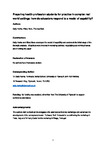Preparing Health Profession Students for Practice in Complex Real World Settings: How Do Educators Respond to a Model of Capability?
| dc.contributor.author | Hanks, Sally | |
| dc.contributor.author | Neve, Hilary | |
| dc.contributor.author | Gale, Thomas | |
| dc.date.accessioned | 2021-08-16T11:07:53Z | |
| dc.date.available | 2021-08-16T11:07:53Z | |
| dc.date.issued | 2021-05-26 | |
| dc.identifier.issn | 2051-6223 | |
| dc.identifier.issn | 2051-6223 | |
| dc.identifier.uri | http://hdl.handle.net/10026.1/17599 | |
| dc.description.abstract |
<jats:p>Undergraduate education often leaves future healthcare professionals insufficiently prepared for the complex and unpredictable workplace. Competency-based medical education (CBME) is widely utilised in health professions’ education, but a growing literature highlights its limitations. Capability is a complex concept which builds on competence, while embedding the integration and adaptation of knowledge, skills and personal qualities. While capability can prepare learners for uncertainty and complexity, the concept has been slow to progress within health professions’ education. We introduced the concept of capability to over 110 international health profession educators through six conference workshops, using a visual model to facilitate understanding. Participants’ post-workshop qualitative feedback was collated and thematically analysed. One hundred and thirty-three free text comments were received and four main themes identified: conceptualising capability, capability as curriculum goal, educating for capability, challenges to implementation. The need for capability resonated with participants, although most were unfamiliar with the concept prior to the workshop. The workshop enabled participants to recognise the limitations of CBME’s ‘tick box’ culture when preparing learners to address complexity. The model helped educators grasp the concept of capability and its potential value in health professions’ education. Participants were then able to identify challenges and suggest approaches for implementing capability in practice. Educating for capability is fundamental for preparing students successfully for the ‘real world’ of professional practice. Most participants agreed it should be the end goal of healthcare education curricula. Healthcare educators are likely, however, to need support to embrace this paradigm shift.</jats:p> | |
| dc.format.extent | 50-63 | |
| dc.language.iso | en | |
| dc.publisher | Coventry University, Lanchester Library | |
| dc.rights | Attribution-NonCommercial-NoDerivatives 4.0 International | |
| dc.rights | Attribution-NonCommercial-NoDerivatives 4.0 International | |
| dc.rights | Attribution-NonCommercial-NoDerivatives 4.0 International | |
| dc.rights | Attribution-NonCommercial-NoDerivatives 4.0 International | |
| dc.rights | Attribution-NonCommercial-NoDerivatives 4.0 International | |
| dc.rights | Attribution-NonCommercial-NoDerivatives 4.0 International | |
| dc.rights | Attribution-NonCommercial-NoDerivatives 4.0 International | |
| dc.rights.uri | http://creativecommons.org/licenses/by-nc-nd/4.0/ | |
| dc.rights.uri | http://creativecommons.org/licenses/by-nc-nd/4.0/ | |
| dc.rights.uri | http://creativecommons.org/licenses/by-nc-nd/4.0/ | |
| dc.rights.uri | http://creativecommons.org/licenses/by-nc-nd/4.0/ | |
| dc.rights.uri | http://creativecommons.org/licenses/by-nc-nd/4.0/ | |
| dc.rights.uri | http://creativecommons.org/licenses/by-nc-nd/4.0/ | |
| dc.rights.uri | http://creativecommons.org/licenses/by-nc-nd/4.0/ | |
| dc.subject | 4 Quality Education | |
| dc.title | Preparing Health Profession Students for Practice in Complex Real World Settings: How Do Educators Respond to a Model of Capability? | |
| dc.type | journal-article | |
| dc.type | Journal Article | |
| plymouth.issue | 1 | |
| plymouth.volume | 9 | |
| plymouth.publication-status | Published online | |
| plymouth.journal | International Journal of Practice-based Learning in Health and Social Care | |
| dc.identifier.doi | 10.18552/ijpblhsc.v9i1.749 | |
| plymouth.organisational-group | /Plymouth | |
| plymouth.organisational-group | /Plymouth/Faculty of Health | |
| plymouth.organisational-group | /Plymouth/Faculty of Health/Peninsula Dental School | |
| plymouth.organisational-group | /Plymouth/Faculty of Health/Peninsula Medical School | |
| plymouth.organisational-group | /Plymouth/REF 2021 Researchers by UoA | |
| plymouth.organisational-group | /Plymouth/REF 2021 Researchers by UoA/UoA23 Education | |
| plymouth.organisational-group | /Plymouth/Users by role | |
| plymouth.organisational-group | /Plymouth/Users by role/Academics | |
| dcterms.dateAccepted | 2021-03-24 | |
| dc.rights.embargodate | 2021-9-22 | |
| dc.identifier.eissn | 2051-6223 | |
| dc.rights.embargoperiod | Not known | |
| rioxxterms.versionofrecord | 10.18552/ijpblhsc.v9i1.749 | |
| rioxxterms.licenseref.uri | http://creativecommons.org/licenses/by-nc-nd/4.0/ | |
| rioxxterms.licenseref.startdate | 2021-05-26 | |
| rioxxterms.type | Journal Article/Review |



